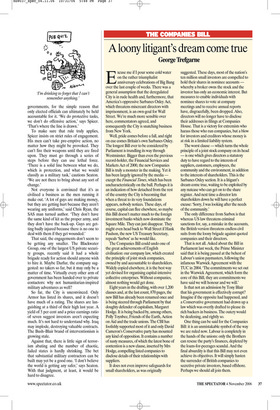A loony litigant’s dream come true
George Trefgarne
Excuse me if I pour some cold water on the rather triumphalist anniversary celebrations of Big Bang over the last couple of weeks. There was a general assumption that the deregulated City is in rude health and, furthermore, that America’s oppressive Sarbanes Oxley Act, which threatens miscreant directors with imprisonment, is an own-goal for Wall Street. We’re much more sensible over here, commentators agreed, and consequently the City is snatching business from New York.
Well, pride comes before a fall, and right on cue comes Britain’s own Sarbanes Oxley. The longest Bill ever to be considered by Parliament is trundling its way through Westminster. Bigger than even the previous record-holder, the Financial Services and Markets Act of 2000, the new Companies Bill is truly a monster in the making. Yet it has been largely ignored by the media except the Financial Times, which has been uncharacteristically on the ball. Perhaps it is an indication of how detached from the rest of the country the City is becoming that when a threat to its very foundations appears, nobody notices. These days, of course, capital can flee elsewhere, so maybe this Bill doesn’t matter much to the foreign investment banks which now dominate the Square Mile. They can just disappear. They might even head back to Wall Street if Hank Paulson, the new US Treasury Secretary, repeals ‘Sarbox’ as he would like.
The Companies Bill could undo one of the great achievements of English civilisation: our company law, which created the principle of joint stock companies, owned by and accountable to shareholders. Widely copied elsewhere, it is the best way yet devised for organising capital-intensive collective enterprises. Without companies, almost nothing would get done.
Eight years in the drafting, with over 1,200 clauses and, at the last count, 870 pages, the new Bill has already been renamed once and is being steered through Parliament by that doughty defender of capitalism, Margaret Hodge. It is being backed by, among others, Polly Toynbee, Friends of the Earth, Action on Aid and the trade unions. The CBI has foolishly supported most of it and only David Cameron’s Conservative party has mounted any kind of opposition. It contains a number of nasty measures, of which the latest bone of contention is a new clause, inserted by Mrs Hodge, compelling listed companies to disclose details of their relationships with suppliers.
It does not even improve safeguards for small shareholders, as was originally suggested. These days, most of the nation’s ten million small investors are compelled to hold their shares in nominee accounts whereby a broker owns the stock and the investor has only an economic interest. But measures to enable individuals with nominee shares to vote at company meetings and to receive annual reports have, disgracefully, been dropped. Also, directors will no longer have to disclose their addresses in filings at Companies House. That is a victory for extremists who harass those who run companies, but a blow for investors and creditors whose money is at risk in a limited liability system.
The worst clause — which turns the whole principle of a joint stock company on its head — is one which gives directors a statutory duty to have regard to the interests of suppliers, customers, employees, the community and the environment, in addition to the interests of shareholders. This is the Sarbanes Oxley section. It is a litigant’s dream come true, waiting to be exploited by any nutcase who can get on to the share register. And next time a director lets shareholders down he will have a perfect excuse: ‘Sorry, I was looking after the needs of the community.’ The only difference from Sarbox is that whereas US law threatens criminal sanctions for, say, a mistake in the accounts, the British version threatens endless civil suits from the loony brigade against quoted companies and their directors.
That is not all. Asked about the Bill in Parliament last week, the Prime Minister said that it is being passed at the behest of Labour’s union paymasters, following the infamous Warwick Agreement with the TUC in 2004. ‘The commitments we set out in the Warwick Agreement, which form the core of this Bill, they are commitments we have said we will honour and we will.’ Is that not an admission by Tony Blair that his government is effectively corrupt? Imagine if the opposite had happened, and a Conservative government had drawn up a law which was overtly drafted to please its rich backers in business. The outcry would be deafening, and rightly so.
One thing can be said for the Companies Bill: it is an unmistakable symbol of the way we are ruled now. Labour is completely in the hands of the unions: only the Brothers can rescue the party’s finances, depleted by the loans-for-peerages scandal. And the final absurdity is that this Bill may not even achieve its objectives. It will simply hasten the surrender of British companies to secretive private investors, based offshore. Perhaps we should all join them.


















































































































 Previous page
Previous page